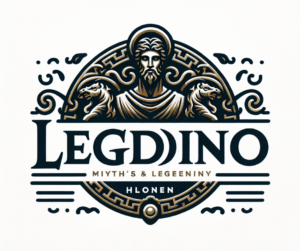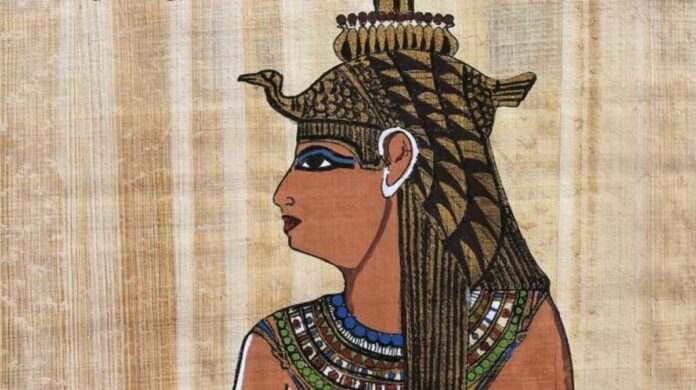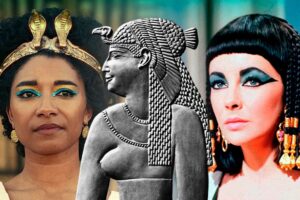
Cleopatra VII, the last active ruler of the Ptolemaic Kingdom of Egypt, is a figure whose allure and influence have transcended time. Her captivating life story, marked by political acumen, romantic liaisons, and dramatic end, has inspired a plethora of representations in pop culture. From ancient Roman literature to modern media, Cleopatra’s legacy continues to fascinate and inspire. This article delves into Cleopatra’s enduring influence on pop culture and explores how her image has evolved from antiquity to the digital age.
The Historical Cleopatra: A Brief Overview
Cleopatra VII Thea Philopator, born in 69 BCE, was a queen of ancient Egypt known for her intelligence, beauty, and political prowess. Her reign was marked by her relationships with Julius Caesar and Mark Antony, which played a significant role in the political landscape of the Roman Empire. Cleopatra’s life ended tragically in 30 BCE, but her legend lived on through the ages.
Cleopatra in Ancient Literature and Art
Cleopatra’s story captured the imagination of Roman poets and playwrights. In particular, Shakespeare’s Antony and Cleopatra (1606) immortalized her as a tragic and enigmatic figure. Shakespeare’s portrayal emphasized her complex personality, blending political ambition with personal vulnerability. This play, alongside works by other classical authors such as Plutarch and Appian, established Cleopatra as a symbol of beauty and power, intertwining her image with themes of romance and betrayal.
Ancient art also contributed to Cleopatra’s mythos. Coins bearing her likeness and sculptures from the Roman period depicted her as a regal and almost divine figure, enhancing her mystique.
Cleopatra in Renaissance and Baroque Art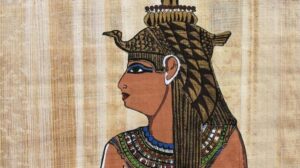
During the Renaissance, Cleopatra’s image was revived in European art, reflecting the period’s fascination with classical antiquity. Artists like Michelangelo and Leonardo da Vinci explored her story, often focusing on her dramatic demise. The Baroque period further embellished Cleopatra’s legend, with dramatic paintings that highlighted her as a tragic heroine, symbolizing the conflict between love and power.
Cleopatra’s Impact on 19th and Early 20th Century Media
Cleopatra’s allure persisted into the 19th and early 20th centuries. In literature, she was a popular subject for novels and plays, including George Bernard Shaw’s Caesar and Cleopatra (1898), which presented her as a shrewd and ambitious leader.
The advent of cinema brought Cleopatra to the big screen. The silent film era introduced Cleopatra in films such as Cleopatra (1917), starring Theda Bara, whose portrayal contributed to the “vamp” archetype. The 1953 film Cleopatra, starring Elizabeth Taylor, is perhaps the most iconic, cementing Cleopatra’s image as a glamorous and seductive queen. Taylor’s portrayal, combined with the film’s lavish production, set a new standard for cinematic depictions of historical figures.
Cleopatra in Modern Media and Pop Culture
Today, Cleopatra continues to captivate audiences through various media platforms. Her influence is evident in television series, music, fashion, and digital content.
- Television: Cleopatra’s story has been adapted into several television series, including Cleopatra (1999), a miniseries starring Leonor Varela. These modern adaptations often focus on her political strategies and romantic entanglements, reflecting contemporary interests in complex female protagonists.
- Music: Cleopatra’s impact extends to music, with artists drawing inspiration from her legendary status. Songs like Cleopatra by The Lumineers and Cleopatra by Cole Porter highlight her enduring appeal and cultural significance.
- Fashion: Cleopatra’s style continues to influence fashion. Modern designers often draw on her iconic looks, incorporating elements like elaborate headdresses and flowing gowns into their collections. This ongoing influence is a testament to her lasting impact on aesthetics and style.
- Digital Media: In the digital age, Cleopatra’s image is pervasive in memes, online discussions, and social media. Platforms like Instagram and TikTok feature Cleopatra-inspired content, demonstrating her relevance in contemporary digital culture.
Cleopatra’s Legacy: A Timeless Icon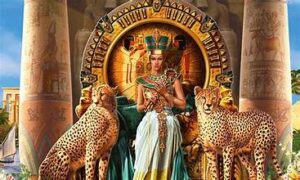
Cleopatra’s influence on pop culture underscores her status as a timeless icon. Her story, characterized by political intrigue, romance, and tragedy, has inspired countless interpretations across different media. From ancient literature to modern digital platforms, Cleopatra’s legacy endures, reflecting both her historical significance and her ability to captivate the human imagination.
As we continue to explore Cleopatra’s impact on pop culture, it is clear that her image will evolve, but her allure will remain. Whether through historical dramas, fashion statements, or digital memes, Cleopatra’s presence in media ensures that her story will continue to enchant and inspire future generations.
